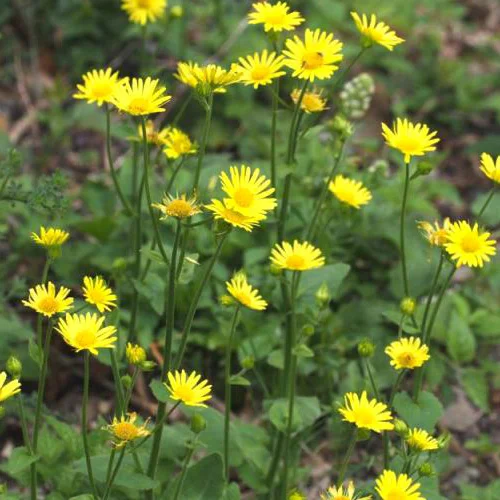
Introduction
Doronicum pardalianches, commonly known as scorpion’s tail or leopard’s bane, is a perennial herbaceous plant that belongs to the Asteraceae family. This plant is native to the mountainous regions of Europe and parts of Asia. It is often found in grasslands, meadows, and other high-altitude locations. The plant is particularly notable for its striking, bright yellow flowers that resemble daisies, and its historical use in traditional medicine.
Forms of Doronicum pardalianches
Doronicum pardalianches can be found in several forms:

- Fresh Plant: The plant is sometimes harvested for use in its fresh form, often for making tinctures or extracts. The leaves and flowers are the primary parts used in medicinal preparations.
- Dried Herb: In dried form, the herb is commonly used in teas or infusions. It retains its medicinal properties when dried and can be stored for longer periods.
- Tinctures & Extracts: Doronicum pardalianches is often made into tinctures or concentrated liquid extracts. These forms are more potent and are commonly used in herbal medicine for specific therapeutic purposes.
- Powdered Form: The dried parts of the plant can be ground into a fine powder and used in capsules or tablets. This form is convenient for those who wish to take the herb in a controlled dosage.
Benefits of Doronicum pardalianches
Doronicum pardalianches has a long history of use in traditional medicine, especially in the treatment of various ailments. Some of its known benefits include:

- Anti-inflammatory Properties: Doronicum pardalianches contains compounds that have shown anti-inflammatory effects. This makes it useful for treating inflammatory conditions such as arthritis and muscle pain.
- Digestive Health: The plant is thought to have mild digestive benefits. It has been used to alleviate indigestion, bloating, and stomach discomfort. It is believed to stimulate the digestive system, promoting better nutrient absorption.
- Antioxidant Activity: The flowers and leaves of Doronicum pardalianches contain antioxidants, which help to neutralize harmful free radicals in the body. This can support overall health and protect against chronic diseases related to oxidative stress, such as heart disease.
- Respiratory Support: Some traditional uses of the plant involve using it as a remedy for respiratory ailments, including coughs, colds, and bronchitis. It is thought to act as an expectorant, helping to clear mucus from the respiratory tract.
- Fever Reduction: Doronicum pardalianches has been used as an antipyretic (fever-reducing) herb. It is believed to help lower body temperature during fever episodes and can be used as a supplementary treatment during the early stages of an illness.
- Pain Relief: Due to its anti-inflammatory properties, Doronicum pardalianches has also been used as a natural pain reliever. It may be effective in reducing minor aches and pains associated with muscle or joint inflammation.
Side Effects and Precautions
While Doronicum pardalianches offers several potential benefits, it is important to be aware of potential side effects and precautions:

- Allergic Reactions: Some individuals may be allergic to Doronicum pardalianches or other plants in the Asteraceae family. Symptoms of an allergic reaction could include skin irritation, rashes, or swelling. It is important to conduct a patch test before using the plant in topical preparations.
- Gastrointestinal Upset: In some cases, consuming Doronicum pardalianches in large quantities can lead to mild gastrointestinal upset, including nausea, vomiting, or diarrhea. It is recommended to start with small doses and gradually increase if necessary.
- Toxicity in Large Quantities: Like many medicinal plants, Doronicum pardalianches should be used in moderation. Overuse can potentially lead to toxicity, especially when consumed in high doses for extended periods. Symptoms of toxicity may include dizziness, confusion, or gastrointestinal distress.
- Interaction with Medications: As with any herb, Doronicum pardalianches could interact with prescription medications, especially those related to inflammation, pain relief, or digestion. It is essential to consult a healthcare provider before using it, especially if you are on medication for any chronic conditions.
- Pregnancy and Lactation: There is limited information available on the safety of Doronicum pardalianches during pregnancy or lactation. It is advised that pregnant or breastfeeding women avoid using the plant unless directed by a qualified healthcare professional.
- Not Suitable for Children: Due to the lack of research on its safety in children, it is generally not recommended to give Doronicum pardalianches to young children without professional guidance.
This Article is for Basic Information. Contact a professional doctor before using it.
HAKEEM KARAMAT ULLAH
+923090560000




